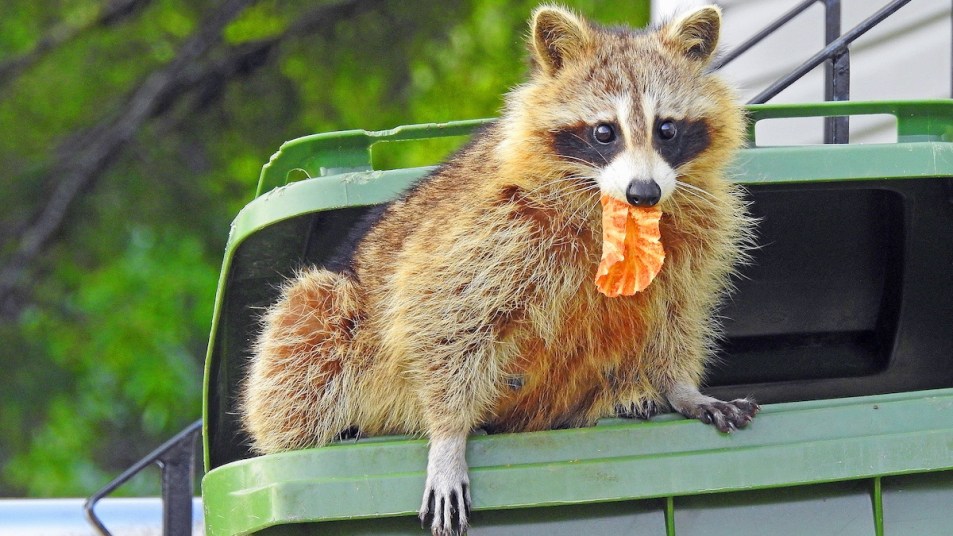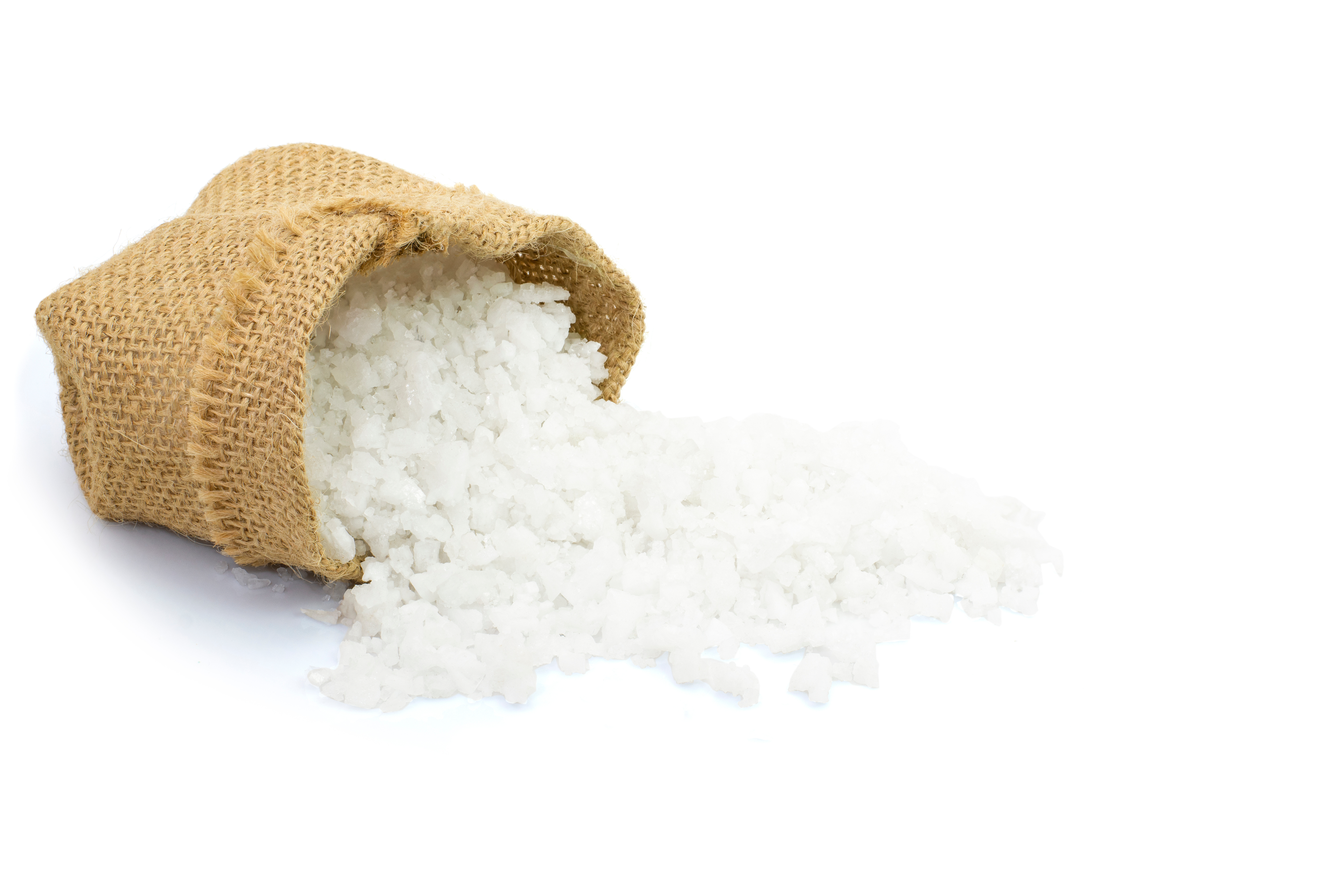This *Food* Keeps Raccoons Away From Your Trash Can — Really!
Plus, 8 more ways to deter the dumpster divers

If you’re like us, you’ve seen your share of gnawed on trash can lids. You’ve woken only to find the little varmints have strewn your lawn with empty food wrappings. In short, if you’ve been visited by one of these cute but guileful critters, you know the mess they can leave behind. The good news? You can keep raccoons from your trash cans and you don’t need to shell out big bucks for a specially designed garbage can to do it. Here, the easiest ways to send them packing — without spending a fortune.
Why are raccoons attracted to trash cans?
Sometimes jokingly referred to as “trash pandas,” raccoons are notorious dumpster divers. “When wildlife come into people’s homes and gardens, it’s always for the same reasons: they’re seeking food or shelter or both,” says animal behavior expert H. Bobby Fokidis, Associate Professor of Biology for Rollins College. “And when it comes to food, smell is the number one lure.” As it happens, raccoons have a keen sense of smell — and they can travel up to 10 miles a day in search of a tasty meal.
Like most wild animals, raccoons look for the path of least resistance when it comes to finding their dinner, so if you leave your trash cans unprotected — with bags containing food scraps inside them — they’re going to view them as that day’s easy meal. They aren’t picky, either — omnivores like us, they’ll dive in for anything you could find on a menu, from veggies to meat to last Saturday’s pizza crusts.
How do you keep raccoons away from trash cans?
Two methods work best: either deter them with smells they don’t like (and thankfully there are actually many), or secure trash cans in a such way that ensures raccoons can’t get their little paws on the contents.
What scents keep a raccoon from trash cans?
Here, 5 smells that will deter raccoons from trash cans — simply find the one you on-hand and follow the easy how-to:
Cayenne pepper keeps raccoons from trash cans
Spicy cayenne pepper gets its heat from a chemical called capsaicin. The burning sensation caused by capsaicin which many people enjoy in spicy food is actually the plant’s natural defense mechanism to stop creatures from eating it — and unlike humans, raccoons heed the warning!
Simply sprinkle enough pepper to form a circle around your cans — or directly on the bags itself — and raccoons’ olfactory senses will tell them to stay away.
Ammonia keeps raccoons from trash cans
Next time you put your trash cans out, simply soak a paper towel in cleaning ammonia, and leave it on top of the trash, under the lid.
“Ammonia not only masks the scent of food in your garbage cans — which is what’s attracting the raccoons — it also deters them, as their strong noses can’t tolerate the chemical odor,” says Brandon Thorsell, manager at Critter Control, adding that you should refresh the towel with more ammonia each time you put a new bag in.
Bleach keeps raccoons from trash cans
Bleach, which can irritate a raccoon’s nasal passages, is another surefire way to send the critters to better-smelling food sources.
Simply pour bleach into a spray bottle and give the trash can lid a good spraying each time you put a new trash bag in, and raccoons will stay away. Also smart? Spray the bag inside the trash can for good measure.
Moth balls keep raccoons from trash cans
Just like ammonia and bleach, the powerful scent of moth balls — which are made from solid forms of compounds naphthalene or para-dichlorobenzene that slowly convert to an odorous gas over time — are another option that can both mask the smell of your garbage and lend its own raccoon-deterring scent.
Just scatter a handful of moth balls around the trash can and toss a few on top of the bag (under the lid) when you place a new one in. Replenish the balls after a strong rainstorm or once a week.
Epsom salt keeps raccoons from trash cans

Epsom salt contains magnesium sulphate, and while we can’t detect its odor, the scent can actually irritate raccoon’s nostrils.
Sprinkle about ¼ cup of Epsom salts around your cans and raccoons will steer clear. Replenish the Epsom salts after a strong rainstorm or once a week.
Spill a little salt on your lawn? No worries! Epsom salt is a natural fertilizer, so unlike table or road salt, it’s perfectly fine if you get some on your grass or flowers!
What non-scented ways can you keep raccoons away from trash cans?
Pull out the baby powder
Raccoons are special in that their “hands” have five digits like ours — that’s what makes them so adept at opening trash lids! Their paws also happen to be extremely sensitive, and one thing they don’t enjoy? The sensation of powder.
Take advantage of their delicate digits and pour about ¼ cup baby powder on top of your trash bag inside the can — if raccoons try diving in for a snack, they’ll get one “finger” into the stuff before quickly moving on in search of a snack with a better sensation.
Get yourself a bungee cord
Animal-proof garbage cans do exist and often feature a screw-on style lid that can deter the critters. The problem? First, raccoons are smart, and over time many have figured out how to twist off the lids. Second, the cans can be incredibly expensive, sometimes costing $200 or more.
A simpler, cheaper idea? “A bungee cord,” suggests Thorsell. “Wrapped around the lid and hooked under the can, it’s strong enough to keep a raccoon out.” Look for ones made specifically for trash cans at stores like Home Depot, Lowes or Amazon. One option: Encased Trash Can Lock Bungee Cord (Buy from Amazon, $14.99).
Watch this YouTube video for the easy how to:
Enlist some of your festive lighting
Raccoons are mostly nocturnal, which means they’re more likely to strike your garbage at night. They also happen to be skittish and will typically bolt if something scares them — which is where your Christmas lights come in.
Simply grab a set of lights that blink (you can buy solar powered ones on Amazon or at Home Depot, no electricity needed), then string them up around the area where you store your trash cans. Raccoons will get one glimpse of the flashing lights and take off for a “safer” location.
Check for, and remove, nesting spots
While raccoons will travel for a tasty snack, for the most part they prefer dining close to home. Which means if they take up rent on your property, they’re more likely to be regular visitors to your garbage, as well.
To deter the “squatters,” just make sure your chimney is capped and any attic access, crawlspaces, sheds and under-deck areas are secured, as these are the most common places in the home raccoons are likely to build a nest.
Lindsay Bosslett is currently associate vice president and managing editor for Health Monitor Network, a patient-education print and digital publishing company. In her role there, she oversees a staff of editors and freelance writers, as well as the production of guides and magazines designed to help both patients and healthcare providers in the ever-changing point-of-care space. As a regular writer for both Woman’s World’s Organized column and First for Women’s Life Smarts page, she delivers practical, creative tips to help women make their lives easier. In her free time, Lindsay enjoys reading, hiking, gardening and attending taco festivals. She lives with her husband, two dogs and lots of bears in a little house on a hill in West Milford, N.J.












